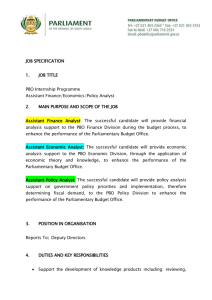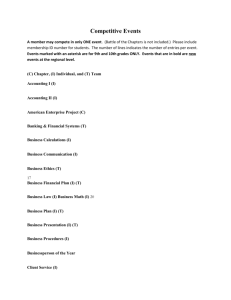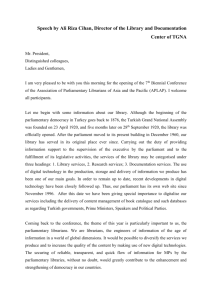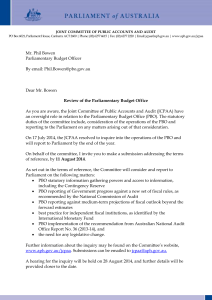Word version - Department of Finance
advertisement
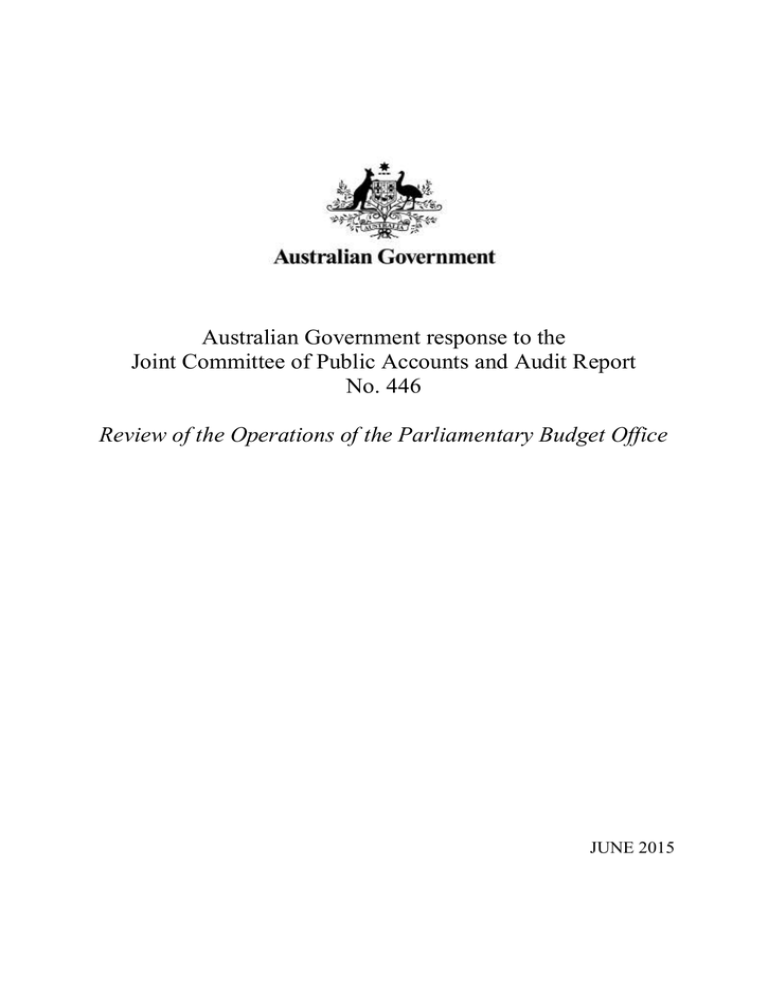
Australian Government response to the Joint Committee of Public Accounts and Audit Report No. 446 Review of the Operations of the Parliamentary Budget Office JUNE 2015 Response to the recommendation(s) Recommendation No. 1 The committee recommends that the Government ensures that Commonwealth agencies meet the timelines in response to a request from the Parliamentary Budget Officer as specified in the Memorandum of Understanding. Noted The Government acknowledges the importance of timely responses by Commonwealth entities to Parliamentary Budget Office requests. At the same time, the Government notes it is important that the deadlines requested by the Parliamentary Budget Officer, where possible, take account of the complexity of the request. Each entity is responsible for managing its own timeframes for responding to requests from the Parliamentary Budget Officer. The Memorandum of Understanding (MOU) provides that, subject to/depending on complexity, urgent requests are to be responded to within 5 days of receipt, and routine requests are to be responded to within 10 days of receipt (paragraph 5.2 (d)). The MOU also expressly provides for negotiation of alternative timeframes (including seeking an extension of time to complete the request) based on the complexity of the request, the level of involvement of other agencies, and competing workload pressures. Recommendation No. 2 The committee recommends that the legal authority of the Parliamentary Budget Officer should be strengthened by specifying the information gathering powers of the Parliamentary Budget Officer in the Parliamentary Service Act 1999. The Government should bring forward amendments to the Parliamentary Service Act 1999 to express the intention of Parliament that the Parliamentary Budget Officer is entitled to free and timely access to all relevant information held by Executive agencies required to perform his or her functions, except where it is unlawful to do so. Noted The Government supports the position that the Parliamentary Budget Officer is entitled to appropriate and timely access, noting that sufficient access to information from Commonwealth bodies is expressly provided for in the existing Parliamentary Service Act 1999. Recommendation No. 3 The committee recommends that the Government release details of the individual components of the Contingency Reserve to the Parliamentary Budget Officer, subject to any non-disclosure requirements considered necessary. Not supported As noted in the Department of Finance’s (Finance) submission to the Joint Committee of Public Accounts and Audit (the Committee), disclosing individual line items in the Contingency Reserve (CR) would be contrary to the public interest. Finance publishes the aggregate estimates for the CR, together with a broad description of the CR, in the Expenses and Net Capital Investment Statement, which in the 2015-16 Budget is Statement 5 of Budget Paper 1 and Attachment D of the Mid-Year Economic and Fiscal Outlook, and where appropriate, in the Pre-Election Economic and Fiscal Outlook. Individual measures in Budget Paper 2 may include a statement that a provision has been included in the CR where the financial implications cannot be published due to commercial sensitivity, national security or where the disclosure would disadvantage the Commonwealth (such as in the negotiation of National Partnership Agreements). Given the sensitivity of some information and the potential harm to the Commonwealth’s interests, as well as to national security, Finance relies on exemptions that are available under the Freedom of Information Act 1982 to exempt such information from release or disclosure. Recommendation No. 4 The committee recommends that where a Commonwealth agency outsources the preparation of the budget estimates and costing of policy proposals to a third party, the terms of the contract should enable the agency or the third party to provide all the relevant data, including the underlying calculations, models and methodology, to the Parliamentary Budget officer under the MoU without charge. Support in part The Government notes that the Australian Government Protocols Governing the Engagement between Commonwealth Bodies and the Parliamentary Budget Officer expressly state that in determining whether information will be released to the PBO, Commonwealth bodies respect and recognise pre-existing intellectual property of any information they hold and/or use that has originally been produced by third parties. The MOU also provides for free access to relevant and accurate information from Commonwealth bodies, but that specific arrangements may need to be negotiated between the parties to obtain information held under license (paragraph 5.4). The Government also notes that situations may arise where an entity has to pay additional fees or charges to access data it does not already retain and/or is not already in its possession. In these circumstances, the Government considers it reasonable for entities to pass these additional costs on to the PBO. Where the preparation of budget estimates and/or costing of policy proposals are outsourced by a Commonwealth agency, the Government expects that these arrangements should be contracted to provide for independent scrutiny by Finance, and notes that these arrangements could extend to the PBO as well. The Government is therefore supportive of entities considering the inclusion of clauses that enable sharing of data with the PBO, subject to pre-existing intellectual property rights, and as contracts come up for renegotiation. Recommendation No. 5 The committee recommends that the Government review Commonwealth statutes and remove legislative barriers to the release of information to the Parliamentary Budget Officer, including those identified in this report. Noted The Government is committed to protecting individual privacy and the confidentiality of data provided to the PBO, noting there are a range of provisions contained in Commonwealth legislation that specifically deal with the protection, handling and transfer of sensitive information, particularly personal information. The Government further notes that, as indicated in the PBO’s submission to the Committee, to date legislative barriers have had very little impact on the PBO’s ability to respond to requests of parliamentarians. The nature of the PBO’s requests for information have focused on summary data and agencies’ models. Recommendation No. 6 The committee recommends that where it is appropriate to retain an administrative discretion, the Government should consider making special provision for the release of data to the Parliamentary Budget Officer and, if necessary, any additional protection for the Commonwealth decision maker. Support The Government notes the PBO’s claim in its submission to the Committee that there have been some instances where legislative provisions have either prevented or delayed the PBO’s access to detailed information and models, including where the provision of information to the PBO requires the exercise of a discretionary power by the Agency Head. In circumstances where sound reasons exist for non-release of information, (for example, commercial, or cabinet in-confidence or intellectual property rights) the Government supports Agency Heads exercising their discretion in deciding the most appropriate approach for their entity. Should significant barriers emerge, the Government would consider additional protection for Commonwealth decision makers, in prescribed circumstances. Recommendation No. 7 The committee recommends that the Parliamentary Budget Officer should prepare and publish medium term projections on an annual basis. The Government should bring forward the necessary amendment to section 64E of the Parliamentary Service Act 1999 to include the annual preparation of medium term projections as a core function of the Parliamentary Budget Officer. The Parliamentary Budget Officer should be consulted, and if required, the Government should provide additional resources to enable the Parliamentary Budget Officer to carry out the new function. Support in part The Government supports the PBO periodically reporting and publishing medium term projections of programme expenditure on an ad hoc basis, which can be done under existing legislation. Section 64E(1)(c) of the Parliamentary Service Act 1999 provides for the preparation of responses to requests relating to the budget, which could broadly include the PBO undertaking medium term projections of programme expenditure. Section 64E(2)(a) expressly states that the PBO’s functions do not include preparing economic forecasts or budget estimates. The Government notes that the difference between medium term projections of programme expenditure and the preparation of economic forecasts and budget estimates is that medium term projections represent extensions beyond the forward estimates (based on assumptions made by the PBO) of published government policies and spending provided by other government entities. The Government also notes that the PBO has previously undertaken this activity, which was published on 22 August 2014, titled ‘Projections of Government spending over the medium term’ within its existing resources. Should the PBO consider there is a case for additional resources, it should seek to bring forward a New Policy Proposal, consistent with the process applied to all Commonwealth entities when requesting additional funds. Further, the Government notes that the Treasury already publishes medium-term projections of key fiscal aggregates (including underlying cash balance, and gross and net debt) each year in the Budget and Mid-Year Economic and Fiscal Outlook. Presentation of these mediumterm projections as part of a document where the primary focus remains on the four-year forward estimates period has benefits. Such an approach sensibly balances the need to illustrate the broad medium-term trends in spending and revenue implicit in current policy settings, on the one hand, against the unavoidable decrease in precision involved in fiscal estimates as the projection horizon increases. Recommendation No. 8 The committee recommends that the Government bring forward amendments to the Parliamentary Service Act 1999, to extend the analysis in the post-election report beyond the period of 4 years (current financial year and 3 year forward estimates) to include, where possible, 10 year medium term projections of the budget impact of the election commitments of the designated parliamentary parties. The committee recommends that the Government consult the Parliamentary Budget Officer about the timing and detail of the information required on which to base the analysis. Noted Consistent with the Charter of Budget Honesty Act 1998 the Government employs a medium term estimates framework, and costings are done on the basis of the budget year and the following three financial years.
